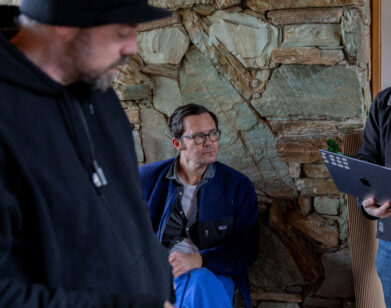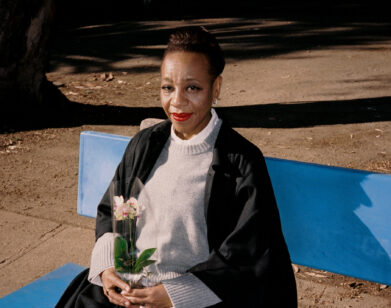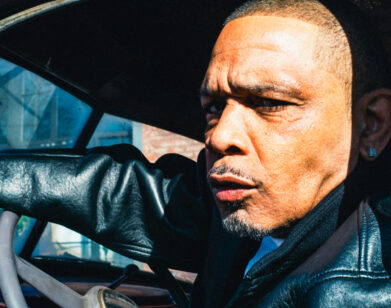LOST IN THE WOODS
Sophie Thatcher and Juliette Lewis Have a Post-Yellowjackets Catch-up

Sophie Thatcher is having a very big year. Currently, she can be seen heading up a group of cyborg bikers on the Star Wars spinoff The Book of Boba Fett, and then there’s Yellowjackets. Very rarely, in this land of a thousand shows, does one manage to rise above the rest, but this winter, Showtime’s survivalist freakout did just that. As the cannibal-cult mystery unspooled week by week, so many people found themselves hooked on the story—of a plane crash that leaves a high school soccer team stranded in the Canadian wilderness, and the effects of that trauma on their adult selves—that by the show’s season finale, Yellowjackets seemed to have consumed all discourse on the internet. A pillar of the show’s appeal is its dual-timeline structure, which allowed relative acting newcomers like Samantha Hanratty and Sophie Nélisse to share characters with beloved veterans like Christina Ricci and Melanie Lynskey. Thatcher, who is 21 years old and grew up in the Chicago area, got to share her character Natalie with Juliette Lewis. Together, they made Natalie into a nuanced figure who uses her edgy exterior to mask a deep vulnerability. Here, the pair discuss their shared hopes for their character in season two.
———
SOPHIE THATCHER: Hello, hello.
JULIETTE LEWIS: Hi!
THATCHER: Where are you?
LEWIS: I’m in my little beach house. I’m not even gonna show you, because it’s not my furniture.
THATCHER: I don’t even have furniture yet at my place. I’ve been here for like, a month. I’m finally in New York again. I have my own place and I’m paying rent.
LEWIS: Oh, good.
THATCHER: Finally, I’m not living out of a suitcase, and I cannot tell you how refreshing that is.
LEWIS: This is important! When did that happen?
THATCHER: I’ve been living out of a suitcase for the past two years, and I thought I was all for that nomad lifestyle, but it got to the point where it was emotionally draining. I couldn’t get myself to set a routine for the day.
LEWIS: Yes.
THATCHER: And it’s hard when you’re not “working.” That’s been hard after Yellowjackets because we had this routine, but now it’s like, “What the hell do I do?”
LEWIS: You have to carve it out. I had this similar thing because I sold my house right before Yellowjackets. So quite literally, but not tragically, I was homeless. [Laughs]. In the sense that I had no home, other than when we were there in Vancouver. Right now, I have a mattress that’s on the floor.
THATCHER: Same. [Laughs]
LEWIS: The routine of my day is like, “How do I find end tables today?”
THATCHER: Same. I’m all up in IKEA, all throughout the day. It feels good to finally have a sense of home. I guess we’ll have to get used to Vancouver being home for a bit.
LEWIS: I really don’t want that to happen. I want them to shoot somewhere else. I pray. Only because we were locked up in a country. It was strange.
THATCHER: If we were to go back, I think that would be the most important thing. I think it was hard on all of us, emotionally. Being isolated in the wilderness was the hardest part. Compared to everyone’s mentality during the pilot, things just got a lot darker.
LEWIS: It was so dark.
THATCHER: But it’s because of the premise of the show, I know that.
LEWIS: You were in the wilderness, and then each of our adult lives in this show is in some stage of falling apart—or in Misty’s case, coming together. She’s the only character where it’s like, “Oh, it’s all working out.” That must have been wild being in the woods all the time. You guys went to a whole other cult-y level.
THATCHER: It was pretty immersive, due to the fact that we were just with each other. I think out of everyone—and we’ve talked about this a bit—I was surprised by Natalie’s trajectory in the wilderness. The character went to a place I wasn’t expecting.
LEWIS: You mean in terms of a love relationship, right?
THATCHER: Exactly. It was interesting because she found this lightness. I really appreciated that, because it gave her dimension. She took on this new addiction.
LEWIS: It’s weird with shows. I’ve never been able to wrap my head around a long-term series.
THATCHER: You haven’t done any of that before, right?
LEWIS: Oh, no. I’ve signed long-term series contracts three times in my adult life. This is the third. But both you and I were pitched something about Natalie being really intelligent, and her skillset developing in the woods that I would like to see more of in the future.
THATCHER: They have to do it in season two. What I want the most in the next season is just for younger Natalie to really become the huntress of the group.
LEWIS: Yes!
THATCHER: That’s where she finds her purpose. I was relating to that recently, now that I don’t have a job. I’m like, “Wow.” Being there was my purpose, and now I know I need to find that work-life balance. I don’t know how you do it. I’m kind of realizing that it could take a lifetime for me, but I hope to find that soon.
LEWIS: It starts, like anything, with awareness and a desire for it. When I was younger, I didn’t have the desire for it. I wanted to go as deep as I could in every artistic pursuit. I still like that, but I also want to come back to a home. You know what I mean?
THATCHER: Absolutely.
LEWIS: So you live in New York again, but you’ve always been a New Yorker, right?
THATCHER: I’m from Chicago. I started with Chicago theater. Actually, I’m trying to get back into theater. That’s going to be a big thing for me in New York.
LEWIS: Yes.
THATCHER: It would be more fulfilling to me as an actor to find different balances between TV, indie, and theater. I also feel that way with music and different artistic platforms. I can’t focus on a specific artistic medium for too long, or else there’s too much pressure.
LEWIS: That’s important. First of all, that’s so cool that you have that drive. I’ve talked to actors who don’t have that. They actually want to play a cop, and they’re going to play a cop for 30 years. Or you have your Clint Eastwoods—I don’t know why I go old school.
THATCHER: This search is never-ending. I see that in you, and it’s so admirable.
LEWIS: You’re so sweet. I did it way too late, and you’re on the cusp. I don’t want to get goofy on you, but you can do it all!
THATCHER: [Laughs.]
LEWIS: You have that potential. I look at your drawings and I’m blown away. All I would say is, literally, finish the thought.
THATCHER: That’s one of the hardest things.
LEWIS: You set a goal. So if your goal that day is to draw with charcoal, finish the drawing. One of the most important things for creative people is to finish the thought and walk away. I have friends who are never finished. Only now do I feel like I’m a better songwriter. But in the beginning I was a lot more of a live performer, and I made songs that were good enough to put people on their feet. That was my goal with it.
THATCHER: Did you find it hard to release stuff?
LEWIS: I never thought that we’d be on radio or anything. For me, it was just like putting a set together to tour the world. Now I look back and I’m like, “Ugh.” There’s only two records that I like. The first EP, too. We had a sound. I just don’t like to look back. Now I’m trying to write songs. It’s challenging because I have a group of people.
THATCHER: I would like to be able to collaborate. It’s such an important thing as a musician. It stops your growth if you’re not able to collaborate. I’m still trying to learn and find people here in New York. With Yellowjackets, it was refreshing to meet like-minded actors my age. I’ve never had that. That was a huge step forward for me, because I was learning every day on set from the people who came in.
LEWIS: What do you want to do with music? When I write it feels like being in love. Or like having a big juicy crush. Do you want to do live stuff, or do you want to release a nugget of your words?
THATCHER: I want to start by releasing more. For me, music and acting go hand in hand. I was thinking last night about how we kind of go into this trance-like state. It’s a way to let myself not have control for a bit. Especially with music, I think it’s the most powerful thing that can happen—when I’m fully in it and fully immersed in a sound. But right now, it’s just about recording.
LEWIS: I’m excited to see it all develop. I always said early on that me doing music was a reaction to the pedestal culture of early fame. When I lost my anonymity at 19, it forever made me othered. I never responded well to elitist culture. Rock and roll is so communal. When I’d go on stage and throw myself into bodies, it was a game of trust. “Will they hold me up?” Yes, they did. Now our culture’s fucking bananas, so we’re just riding the wave of safety.
THATCHER: How do you think it would have been different if you’d had social media when you were my age?
LEWIS: Oh, that’s so scary. I remember making the decision to get on MySpace. I had somebody do it for me. I didn’t like being connected in that way, it was too much. It’s like being—this is such a bad metaphor—a little fish safe in your little river, but once you cross over, you’re in a giant ocean.
THATCHER: Right before this, ten minutes before this interview, I was on Instagram looking at Star Wars comments. They’re gnarly. I’m trying to separate myself from it. It’s just so accessible now.
LEWIS: You’ll find your way with it. I just go back to Public Enemy’s “Don’t Believe the Hype.”
THATCHER: Finally, last night, I was like, “I’m deleting them.” That was a powerful moment.
LEWIS: How about the attachment to the identity? Like for me, the identity was built on Instagram over five years. I want to do what I’ve seen certain artists do, where they delete everything and then just start new.
THATCHER: I love that.
LEWIS: I haven’t done it yet.
THATCHER: Especially now that people are watching our show, I don’t want people to know me as Natalie. Both of us aren’t that, at all.
LEWIS: This is exactly the conversation. I don’t have an attachment to the outcome anymore. I actually have relinquished that, because I’ve done so many things where we all thought it was going to hit and be amazing, and then it didn’t even get distributed. There are so many things out of your control. My manager literally had to remind me yesterday, “Juliette, you don’t understand. It’s a big deal to have a hit show.” What will you do today? Will you see a friend?
THATCHER: Today, I’m finishing up press for Yellowjackets. I think it’s good to move on. I work best when I’m not dwelling on the past. I might possibly have a project in New Orleans, but that’s not finalized at all.
LEWIS: Will you do laundry today?
THATCHER: I actually have to do a lot today.
LEWIS: Last night I did laundry. It was like, “Now fold the laundry, J.L..”
THATCHER: Are you working right now?
LEWIS: I’ve been in the new Queer as Folk reboot in New Orleans. So when you said that—
THATCHER: So exciting. Oh my gosh.
LEWIS: I love it so much. It’s such a special, beautiful, visually-colorful show. Super New Orleans-centric.
THATCHER: On the other end of the spectrum from Yellowjackets.
LEWIS: On the complete other side. Literally a walk in the park!
THATCHER: You need that! We need that balance.






